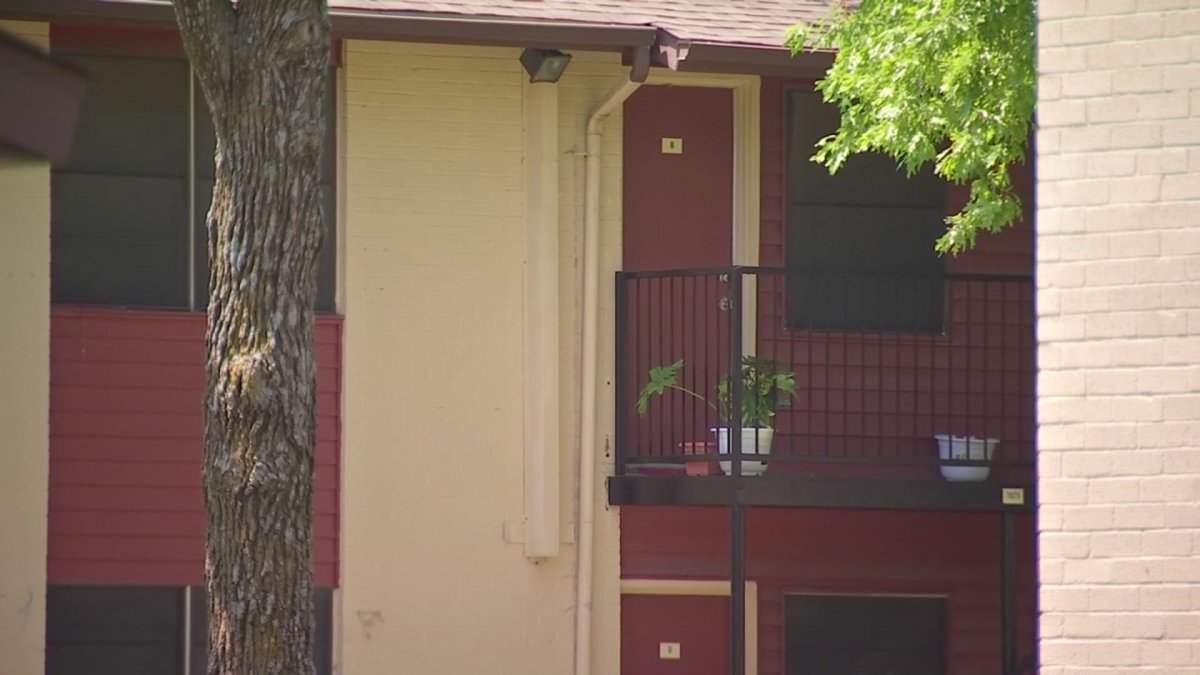
The “Federal Eviction Moratorium” is set to expire at the end of this year. North Texas non-profits worry thousands of people will be homeless in January. But there is help. NBC 5 Responds Reporter Diana Zoga shows us how millions of dollars in grant money is still on the table. You just have to apply.
When Talaiyah Johnson lost her sales coordinator job in March, she had just relocated with her seven-year-old daughter to Texas and wasn’t in the state long enough to begin drawing unemployment.
“I really just had to go into survival mode and figure it out,” said Johnson.
Johnson said she’s been looking for a new job and living off savings and help from family to pay bills during an economic downturn that had millions of Texans seeking unemployment. By October, Texas’ unemployment rate was 6.9% - nearly double what it was at the start of 2020.
“It was a struggle to not know where your next meal is going to come from. Now, your daughter has to do virtual classes and you're stressed out,” recalled Johnson.
By October, Johnson said she’d fallen behind, but learned from her apartment complex that rental assistance was still available for Dallas residents impacted by income loss during the pandemic.
Johnson applied for the grant through the non-profit Wilkinson Center. After about three weeks, she was approved. Johnson said the federal grant, paid directly to her landlord, is covering her rent for October, November and possibly December.
Asked what would have happened if she hadn’t learned about the rental assistance, Johnson said, “I know the reality would have been her and I would have not had a roof over our head.”
Local
The latest news from around North Texas.
There is currently a ban on some residential evictions for non-payment of rent, put in place by the Centers for Disease Control to contain the spread of COVID-19. But unless Congress intervenes, the eviction ban expires Dec. 31.
“Addressing this coming eviction wave should be our community’s number one priority right now,” said Ashley Brundage, Executive Director of Housing Stability at the United Way of Metropolitan Dallas.
Brundage believes thousands of North Texans will face eviction at the start of 2021.
“We need is another Act to come through at the federal level where they're investing billions of dollars into rental assistance,” said Brundage.
She added that a national standard eviction moratorium along with funding to prop up landlords is needed to help people stay housed during the pandemic.
“You cannot have a moratorium without the rental assistance dollars to go behind it because this is impacting our landlords. Almost half of our landlords are mom and pop landlords. They have 10 units or less. So, they rely on this income just as much as somebody is relying on that apartment to live in,” said Brundage.
In the meantime, 15 organizations are teaming up to help people apply for rental and utility assistance. The funding behind The Dallas Rental Assistance Collaborative comes from the CARES Act and other grants.
Dallas residents must make less than 80% of the Dallas-area median household income. For example, an individual would have to make less than $48,300 this year. Applicants could not have received other CARES Act housing assistance or currently be on a voucher program, living in HUD housing or in a relative’s home.
Applicants should be able to show that COVID-19 impacted their income through job loss, cut hours or furlough. People who have experienced increased healthcare and household expenses that limited their ability to pay rent can also qualify.
Many of the application deadlines are in early and mid-December.
CARES Act funding for rental and utility assistance must be used by Dec. 30, but United Way said other funding sources are coming in.
“Don't wait until you get an eviction notice to reach out for rental assistance help. If you have any sort of back rent that's due, even if it's not your full amount of rent, reach out because we can help,” said Brundage.
Johnson said it took her a few hours to pull together all the required paperwork, including a ledger from her apartment complex showing her payment history.
“It's not as daunting as it looks. You have to slow down, even though you're in an emergency situation,” said Johnson. “If you give yourself a day to get all of those things on the check-list and upload them, it will make it a lot easier.”
Johnson said she routinely emailed her case manager to check-in. She said it may take a few weeks to learn if you’re approved.
“I just had to take one day at a time. Sometimes, it wasn't even one day at a time. Sometimes, it was literally one hour at a time because it was so overwhelming,” said Johnson.
Depending on where you live, CARES Act rental and housing assistance may still be available. NBC 5 Responds is including links to many applications below.
Keep in mind, if your county or city is no longer offering assistance related to the CARES Act, housing advocates want you to reach out to area nonprofits to find a group that can help.
You can search 211texas.org for assistance. In the search box, type “rent assistance” and enter your zip code for a list of agencies to call.
A group of attorneys offering free legal help have listed some non-profits that may be able to provide assistance. This is another good place to start.
If you’re in Dallas, you can apply for assistance here.
If you live in Dallas County, outside the City of Dallas, head here to apply for assistance.
The City of Fort Worth is still taking applications for assistance with housing and household expenses. You can find links to two programs here. The Community Services Block Grant program income limit is $25,520 (gross income – before taxes) for an individual and $52,400 for a household of four. The deadline to apply is December 31. The Coronavirus Relief Fund gross annual income limit is $68,250 for an individual and $ 97,800 for a household of four. Applicants must apply by December 1.
The CARES Act rental assistance program application is still open in Tarrant County. The deadline to apply is December 9. The county estimates between $6 and $9 million of the $10 million allocation will be used.
In Arlington, there is still funding available. You can find the application here. Click on the red “apply for assistance” button.
You can also learn more about help paying utilities in Arlington here.
In Denton County, you can find the rental assistance application to access CARES Act grant funds here. The page says the application deadline closed in November. United Way of Denton County President and CEO Gary Henderson tells NBC 5 Responds, the application is actually staying open through December 1.
In Collin County, the Collin CARES application for housing assistance is closed. Plano, Frisco, McKinney and Allen were part of the Collin County collaboration to administer funding. However, assistance may still be available from other sources. In Plano, a housing assistance program has been expanded during the pandemic. Find out more here.
United Way of Tarrant County’s Area Agency on Aging provides utility assistance to those 60 and older. Individuals can call 817-258-8125 and press 1.
The Aging and Disability Resource Center has a rental assistance program that can assist anyone 60 and older or disabled with a one-time $1000 payment toward their rent. People can call 888-730-2372 for assistance and screenings.
NBC 5 Responds is committed to researching your concerns and recovering your money. Our goal is to get you answers and, if possible, solutions and resolution. Call us at 844-5RESPND (844-573-7763) or fill out our Customer Complaint form.
*Map locations are approximate, central locations for the city and are not meant to indicate where actual infected people live.



